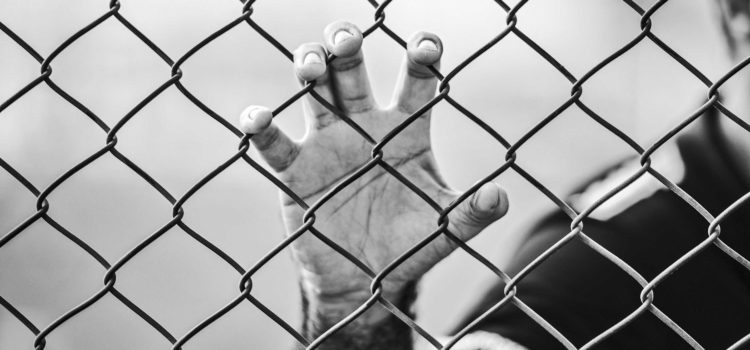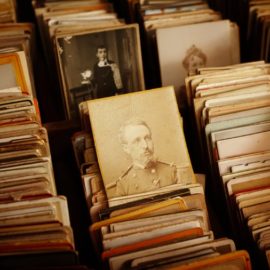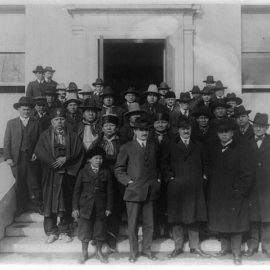

This article is an excerpt from the Shortform summary of "Unbroken" by Laura Hillenbrand. Shortform has the world's best summaries of books you should be reading.
Like this article? Sign up for a free trial here .
Why was Louis Zamperini a POW? What happened to him, and how did he get out?
Louis Zamperini’s POW days lasted for over two years. At two different camps, Louis Zamperini endured torture and starvation at the hands of his captors. Louis Zamperini’s POW experience shaped the rest of his life.
Louis Zamperini: POW
Louie’s and Phil’s active duty ended when the Green Hornet went down, but their trials as American soldiers were just beginning. Aboard the ship, the men were tied to the mast, bound at the hands, and taunted by the Japanese soldiers. When the captain saw what was happening, he ordered his men to untie them and give them water and a biscuit. It was the first thing either had eaten in over a week.
Louie and Phil were taken to an island, where they received a full examination and treatment for their wounds. Before their doomed flight, Louie and Phil each weighed between 150 and 160 pounds. When they were weighed on the island, they discovered they’d lost half their weight.
Along with the medical treatment, Louie and Phil were given plentiful food, alcohol, and cigarettes. They were taken to a room, in which they told their story of their survival to Japanese officials. They learned they’d drifted two thousand miles to the Marshall Islands. Their raft, splayed on a table in front of them, had forty-eight bullet holes in it.
Louie and Phil were given clean beds to sleep in, and it seemed that their nightmare was over. The Japanese continued to treat them with care and concern for two more days, then they were told they were being shipped to another atoll on another island. When Louie and Phil heard the name of the island, their stomachs dropped. They were to be delivered to Kwajalein, known infamously throughout the American ranks as “Execution Island.” Louis Zamperini’s POW days had begun.
Execution Island
On the journey to Kwajalein, the Japanese soldiers were convivial with the Americans. They were fed well and given separate quarters to sleep in. But as the freighter pulled within sight of the island, everything changed.
On July 16, they were blindfolded, fireman-carried off the freighter, and thrown in cells with just enough room for one man. Louie’s cell was infested with bugs, and only a small square window in the door ventilated the room. The air was heavy, hot, and rank from the latrine in the floor.
On one of the walls, Louie found an engraving—“Nine marines marooned on Makin Island, August 18, 1942,” the names of the men etched beneath it. Louie had heard of these marines before, as most American soldiers had. They’d been accidentally left behind after an attack and vanished. Louie was likely the first person to learn their whereabouts.
The fact that these men were nowhere in sight was ominous. Louie called out to Phil and heard a meek response from far away. They had just enough time to check on each other’s well-being before a guard came in. Louie took in his surroundings, his emaciated body, and his circumstances and started to weep. He covered his mouth to muffle his sobs.
Wishing for Death
Louie and Phil would stay on Kwajalein for 42 days. The ordeal they experienced was worse than what they’d survived on the raft, and Louie found himself wishing for death on several occasions.
Each day, Louie was given a golf ball-sized dry biscuit and a swallow of hot brown water. The biscuit was thrown through the window and shattered on the ground, leaving Louie to scramble for crumbs like a rodent. Louie soon learned that the marines had been executed, and from that day on, he waited to be pulled from his cell and beheaded.
The guards at Kwajalein seemed to find pleasure in outdoing each other with cruelty. When Louie begged for water, they threw scalding water in his face. He was poked with long sticks through the window and made to dance while they threw stones at him. Almost daily, one of the guards sliced his hand across his throat while laughing.
On at least two occasions, a submarine docked near the island, and more than 80 men came ashore and took turns abusing Louie and Phil. They threw stones and sharp sticks at the crouching men and spit on them. Phil and Louie couldn’t communicate, but they made scuffing sounds on the floor to signal that they were still alive. Under these conditions, Louie was starting to feel a loss of dignity and, with it, a diminishing will to live.
Both Louie and Phil were pulled from their cells on several occasions. Believing they were headed for execution each time, they were surprised to be taken to an interrogation room. The men were questioned about the logistics of American bombers and base sites in Hawaii. Louie told as much of the truth as he could except when it came to the bases. He pointed out the fake base sites built on Hawaii to fool Japanese bombers.
On four other occasions, Louie and Phil were taken to the infirmary, where medical experiments were performed on them. They were injected with solutions that left them dizzy, wracked with pain, and covered in rashes. That both Phil and Louie survived these experiments was lucky. Thousands of other POWs who’d undergone similar experiments died.
Finally, Louie and Phil were slated for transfer to an official POW camp in Japan. Louie was hopeful, for prisoners were supposed to receive supplies from the Red Cross at these camps and be able to make contact with their families. Also, the transfer meant they wouldn’t be executed, which had seemed likely once their usefulness to the interrogators and doctors was done. The reason they were spared execution would be a mystery for a long time.
Ofuna
After journeying for three weeks by ship, Louie and Phil were dropped off at Ofuna, a secret POW camp in Japan. When they arrived, Louie was granted the first bath he’d had since leaving Hawaii, then led to a room where his USC buddy Jimmie Sasaki was seated.
Louie was never privy to the suspicions and investigations surrounding Jimmie back home, so he was dumbfounded to see this man at a prison camp. They spoke for a long time, with Jimmie mostly reminiscing about their days at USC or bragging about his high-ranking position in the Japanese military. Louie thought Jimmie had been the one to authorize his stay of execution and expected something to happen after seeing him, but nothing did. Louie was taken out of the room and into the yard where he met 200 fellow prisoners.
Louis Zamperini’s POW experience at Ofuna was horrific. Ofuna was not on the radar of the Red Cross because it was not registered as an official POW camp. The guards and officials who ran the camp did not abide by the rules of the Geneva Convention regarding prisoners of war. Instead, the camp operated under different sets of rules instituted to break and humiliate the captives.
Prisoners could not speak or make eye contact with each other; eyes had to be cast down at all times; prisoners had to learn Japanese in order to understand instructions; each morning started with tenko, or roll call; and every aspect of camp life had to be followed to the tee. Any deviation from these rules elicited harsh beatings.
Because no one outside Japan knew about the camp, the beatings could be as vicious as the guards wanted. Death was not off the table for anyone. The guards used clubs to beat the men, and any attempt a prisoner made to protect himself or help others led to increased violence. The most feared guard of all was a man nicknamed “The Quack,” who was particularly cruel and sadistic.
The men at Ofuna were emaciated and made to starve while guards pilfered the food shipments. Rations consisted of putrid broth and contaminated rice, neither of which had any nutritional value. Dysentery was rampant, and Louie grew so thin, he could barely stand. He thought Jimmie, who visited often, would help him, but all Jimmie ever did was talk about USC. If it wasn’t for the help of two kitchen aids, who slipped Louie extra balls of rice, he likely wouldn’t have survived.
The Bird of Omori
Whatever Louie and the other men had experienced at Ofuna would soon pale in comparison to life at their new POW camp: Omori. A Japanese corporal named Mutsuhiro Watanabe was in charge of disciplinary measures, and none of them, especially Louie, would be spared his wrath. Wantanbe is called “The Bird” in Unbroken.
Omori was on an artificial island in Tokyo Bay connected to the main city by a bamboo-slat bridge. Watanabe had arrived in winter 1943 and soon became one of the most feared guards in the country. His tactics were so ferocious, Omori became known as “punishment camp.” The prisoners had many names for Watanabe, but the one used the most was “the Bird.”
Watanabe was from an affluent, privileged family. He studied French literature at university and moved to Tokyo to work in a newsroom after graduating in 1942. When Japan went to war, he quit his job and enlisted. Watanabe’s sights were set on becoming an officer, like his brother, and felt his privilege and education made him a certain candidate. But he was passed over for promotions and told he would never move beyond corporal. That decision would be the catalyst for the suffering of hundreds of men in the years to come.
American Heroes and Rescuing the POWs
The atom bombs changed everything. With two cities virtually wiped from existence, the Japanese surrender would follow shortly. Although life at camp seemed unchanged, the POWs could tell something was off. The Bird started making trips away from the camp, and the violence had abruptly ceased. The sudden relief was nearing too little too late for Louie.
Louie spent most days suffering in bed. He was tormented by fevered dreams of battles to the death with the Bird and vomited frequently. When he touched his legs, his fingers left indentations. Louie had contracted beriberi, a life-threatening vitamin B deficiency that can lead to heart failure, paralysis, and death.
On August 15, the POWs at the camp and work stations noticed something strange—silence. The Japanese guards had disappeared. At camp, Tinker found them huddled in an office around a radio, but he couldn’t tell what was being said. At the worksite, one guard told a POW that the war was over. The POW told the others back at camp, but no one knew what to believe. Still, for the first time in months, no planes flew overhead and no sirens went off. The men were cautious of this news. The kill date was only a week away.
The morning of August 20, the camp commander gathered the seven hundred POWs in the yard and announced that fighting had ceased. He said they could bathe in the nearby river, something they’d never been allowed to do.
Louie stumbled into the water with the others. Suddenly, a loud rumble thrashed through the sky, and the men looked up to see a bomber heading straight toward them. It wasn’t until the plane was directly overhead that they saw American emblems on the side. Louis Zamperini’s POW experience was soon going to end.
The men laughed, cried, and wagged their arms at the waving pilot. They rushed back to camp and set part of it on fire. The pilot dropped bars of chocolate, cartons of cigarettes, and a note that supplies would be delivered soon. Inside the package was also a magazine with a picture of the nuclear cloud over Hiroshima. The cheers died down, and the men stared in shock.
Some of the men went to find the Bird, but he was already gone. At some point over the last day, the Bird had shed his uniform, grabbed a bag of provisions, and vanished. For Louie, the moment was different. He didn’t have enough strength for the jubilant celebration. Louie stood still, barely able to hold himself up, and thought one phrase over and over: “I’m free.”
Even though Louis Zamperini’s POW experience left him deeply traumatized, he found healing power in his ability to forgive. Louis Zamperini, a POW survivor, became a motivational speaker and worked to convey his message throughout his life.

———End of Preview———
Like what you just read? Read the rest of the world's best summary of Laura Hillenbrand's "Unbroken" at Shortform .
Here's what you'll find in our full Unbroken summary :
- How Louie Zamperini was on track to become an Olympic athlete until the war started
- The unbelievable story of his capture as a prisoner of war
- The ultimate fate of Louie and his captors






